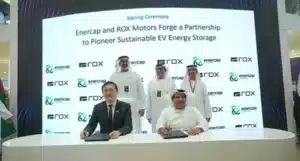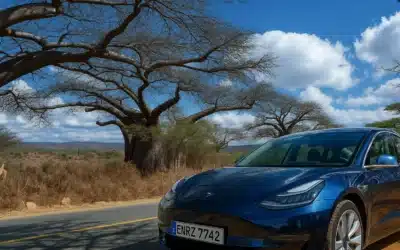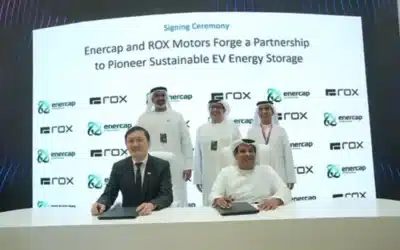The idea of half the cars on the roads of the UAE being electric may feel like the stuff of science fiction. But that’s the ambitious target set for 2050 by the government. In line with this goal, there are plans to establish a new network of electric vehicle charging stations across the country. The announcement was made by Suhail Al Mazrouei, the Minister of Energy and Infrastructure, who also revealed details of the National Electric Vehicles Policy approved by the UAE Cabinet.
This policy builds on the launch in May 2023 of its flagship ‘Global EV Market’ project to turn the UAE into a global market for electric vehicles. It reflects the government’s commitment to supporting and promoting sustainable transportation options.
By encouraging the adoption of electric vehicles (EVs), the government aims to reduce energy consumption by 40% and carbon emissions by 10 million tonnes over the next three decades.
The decision comes at a time when many countries around the world are embracing electric mobility as a means to combat climate change and reduce dependence on fossil fuels. Electric vehicles offer several advantages over traditional internal combustion engine cars, including lower emissions, reduced noise pollution, and potentially lower operating costs.
One of the key challenges in transitioning to an EV-dominated transportation system is establishing a reliable charging infrastructure. To address this issue, the UAE plans to develop a comprehensive network of EV charging stations throughout its major cities and highways. This will ensure that EV owners have convenient access to charging facilities wherever they go.
Currently, there is already a good network of EV charging stations available in select locations across Dubai and Abu Dhabi. However, their numbers are still limited compared to traditional petrol stations. The new initiative aims to significantly expand these facilities while also improving their accessibility for all residents and visitors alike.
The proposed network will consist of various types of chargers catering to different needs – from fast chargers capable of delivering high power for quick top-ups during long journeys or emergencies, to regular chargers suitable for overnight charging at home or work locations. These chargers may be installed in public areas such as shopping malls, parking lots, hotels/resorts or along major highways with rest stops.
To ensure the success of this initiative, the government will collaborate with relevant stakeholders including utility companies, real estate developers, and private businesses. By working together, they can identify suitable locations for charging stations and incorporate them into new developments or retrofit existing infrastructure.
Furthermore, the UAE government plans to offer incentives to encourage individuals and businesses to switch to electric vehicles. These incentives may include subsidies or tax breaks for purchasing EVs, reduced electricity rates for charging at home or work locations, and priority access to parking spaces equipped with charging facilities.
In addition to the infrastructure development and incentives, the National Electric Vehicles Policy will also focus on promoting public awareness and education about electric mobility. This includes providing information on the benefits of EVs as well as dispelling common misconceptions or concerns potential buyers may have.
To support these efforts, partnerships with automotive manufacturers are expected in order to bring a wider range of affordable electric vehicle models into the UAE market. This will give consumers more options when considering an EV purchase while also driving competition among manufacturers leading to better technology advancements in this sector.
The transition towards electric mobility is not only beneficial for reducing greenhouse gas emissions but also has positive economic implications. The UAE is one of the world’s largest oil producers; however, its heavy reliance on fossil fuels makes it vulnerable to fluctuating oil prices. By diversifying its energy sources through increased adoption of renewable technologies like EVs, the country can reduce its dependence on oil exports while creating new opportunities in clean energy industries such as manufacturing batteries or developing cutting-edge charging technologies.
Furthermore, transitioning towards electric vehicles can create jobs within various sectors including construction (for building charging infrastructure), maintenance (for servicing and repairing EVs), and renewable energy (for generating electricity from sustainable sources).
While there are challenges associated with achieving 50% electrification by 2050 – such as high upfront costs compared to traditional cars – the UAE government’s commitment is a significant step towards a more sustainable transportation system. By investing in the necessary infrastructure, offering incentives, and promoting awareness, they aim to make electric vehicles an even more viable and attractive option for residents and visitors alike.











